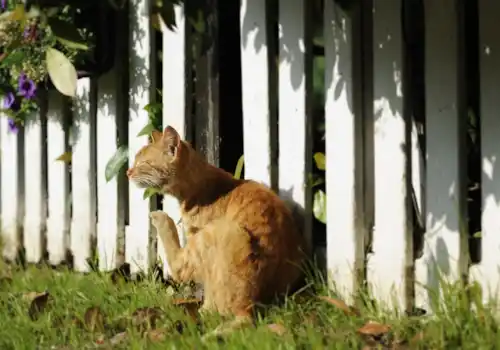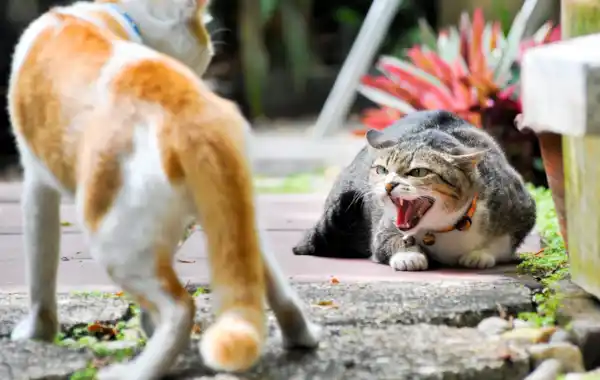If your cat is getting bullied by other felines in your neighbourhood, this advice will help
If your cat is getting bullied by other felines in your neighbourhood, it can make life miserable for both of you. Toni Shelbourne helps you to manage the situation and keep your kitty safe
Why is my cat being bullied?
Cats will try to avoid getting into fights; however, they can be very territorial, and, especially in built-up areas where the feline population is denser, conflicts may occur. Although there can be many reasons for aggression, it’s often over territory; most will attempt to defend their home range from invasion by others, while assertive cats may try to extend their territory, and if you have a shy, less confident kitty he can be an easy target.
Cats in effect have a right to roam so an owner is not legally responsible for where their pet goes. But owners do have a Common Law Duty of Care to take reasonable steps to ensure their pets do not injure people or damage property. This includes other cats, which are regarded in law as being ‘property’. Cases involving damage to property or injury to people by cats are, however, rare.
Management of the situation is key to minimising distress and injury to your cat if he’s getting picked on, and you may find you’ll need to adopt more than one approach.
Top tip: If you haven’t already done so, consider insuring your cat as veterinary treatment for injuries can be expensive if he gets into a scrap.
Did you know? Neutered cats tend not to roam so far and are less likely to fight.
Time sharing
Many cats sharing territories learn to ‘time share’ to avoid conflict; for example, one using the area in the morning and another in the afternoon, but a bully cat may not be inclined to such a peaceable work-around. If you know who the owner of the offending cat is, and can have a calm conversation with them explaining the problem, you may be able to come to an agreement, imposing a rota on your kitties. If you know the offending cat won’t be around during certain hours, you can then encourage yours to venture outdoors at that time.
Of course, this will only work if both cats have reliable recalls to ensure they stick to their allocated times, and won’t work at all if the offender is a stray, in which case you will have to use other stratagems.
Top tip: If the aggressor appears to be a stray, it may be possible to gain assistance to humanely trap, neuter, and rehome the individual.
INDOORS…
Secure your house
Bullies are often bold and obnoxious, entering your house and intimidating your cat in what should be his own safe space. This is often to access food you’ve left down, so either make sure food and water are not located near exits or clear away leftover food once your cat has finished. Timed feeders may be another solution, keeping food fresh and secure, but wily trespassers may learn as quickly as your own kitty when mealtimes are due to be dispensed.
Cat flaps
If you are able to install a cat flap, it will help secure your house so your cat won’t be threatened within his home. It will need to be one which only opens for him however; magnetic and infrared flaps activated by a special collar worn by your cat may be the solution, but can sometimes be problematic. Trouble arises if your cat loses the collar, and any cat wearing a similar device may also be able to enter. Although they are a little more expensive, a microchip operated cat flap may be more fool proof, as the reader in it will only respond to your cat’s pre-programmed microchip.
Window screens
Don’t forget windows! Opening them to allow a welcome breeze in during the summer can also create a point of entry for unwanted feline visitors. Cat proof mesh screens may be the answer, with the added bonus that it will help keep flies out too.
Toileting
If your cat has become too scared to go out and has started to toilet in the house through stress, provide a well-placed litter tray. It should be located well away from the normal exit, as he may be anxious about approaching the area near the cat flap if he’s previously been chased through it by the bully.
It also needs to be situated away from his food and water and in a quiet area of the house where he won’t be disturbed. Cats can be very particular about litter trays, needing a certain size, covered or not covered, or a specific type of litter, with preferences varying between individuals.
If you find he’s still toileting inappropriately, as well as experimenting with different trays and litters, you may also need to place several in different spots around the house to find the ideal location. Remember to clean any offending smells from inappropriate toileting with the right products or he may continue to soil in the wrong spot, and to clean the trays out frequently as felines generally don’t like to toilet in soiled litter.
…AND OUTDOORS
Create safe outdoor spaces
If you want to provide safety in your garden, there are many options. Be creative but know your cat and his likely preferences.
Cat platforms
Many cats like to get up high out of the way of danger. If you don’t have trees in your garden, an outdoor cat tree may help him feel safe, as he can retreat up to the top, giving him an advantage over the bully.
Access to sheds or garages
If your cat lives outside when you’re out and is more likely to run and hide than to climb, you may have a shed or garage to which you can fit a secured cat flap that only allows him to access it. It would give him another alternative place to run to; and if for some reason you can’t fit a cat flap to your house door, it will also give him somewhere warm and dry to go on cold days.
Secure the garden
Cat-proof fencing can be very effective at keeping your cat contained in your garden, safely away from any local feline toughs. It also helps deter other cats from venturing in — although if one does get in, it may equally make it hard for him to escape again, so it’s a good idea to check carefully before allowing your own kitty out.
It’s not the cheapest option but you might consider it a good investment when you weigh up the expenditure against potentially large vet bills if your cat is injured by another. You will also have peace of mind knowing he’s safe from other dangers such as road traffic.
A 2021 study revealed that the welfare scores of cats previously accustomed to free-roaming improved significantly when their outdoor access was confined within a garden area enclosed by cat-proof fencing. Rather than creating stresses, it appeared to reduce them, through allowing them to control their own territory and reducing exposure to feline aggressors.
Catios
Secure outdoor enclosures (sometimes referred to as catios) have gained a lot of popularity in recent years and can be a good compromise between having an indoor/outdoor cat if you have the space and funds to build one. These outside spaces enable you to extend the security of your house into your garden; if you live in a flat or apartment, smaller versions can be built on balconies or even window-box style. Inside you can provide access to plants he may like to nibble at, while he’ll also benefit from the mental stimulation of seeing and smelling the world around him.
Accompanied excursions
Not all of the ideas listed here may be possible if you’re on a tight budget or are limited by tenancy agreements, but if you are at home during the day and have a garden which you enjoy spending time in, then accompanying your cat outside may be the answer. Many shy but strongly bonded cats enjoy sticking close to their owners, and if you reinforce this by showing him that you provide security, fun, and yummy treats, he will soon learn to come to your call or retreat to you in times of need.
Keeping calm
As well as taking measures to keep your cat safe, you may also need to address the emotional toll which encounters with a bully can inflict. Using a calming plug-in product like Feliway or Pet Remedy may be an aid to restoring calmness and reducing stress. You can also try doing some calming Tellington TTouch Training body work or even get him the feline version of the Thundershirt familiar to many dog owners. All of these will help in restoring his emotional balance and confidence.







